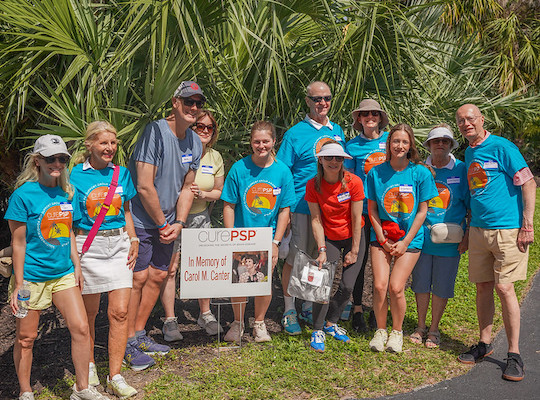CurePSP Awards Record Number of Urso Student Fellowship Grants to Projects Answering Urgent Questions Around Tauopathies
Jul 19, 2024 Oscar Sullivan
CurePSP awarded a record number of Urso Student Fellowship Grants to students and trainees conducting projects that hope to answer questions in the progression of progressive supranuclear palsy (PSP), corticobasal degeneration (CBD) and related diseases, as well as expand the community of researchers dedicated to finding a cure. The Urso Student Fellowship Grant, supported by the Paul and Ruth Urso Memorial Research Fund, was awarded to eight projects focused on basic, translational, clinical or epidemiological aspects of PSP and CBD. The record eight recipients have identified urgent questions regarding tauopathies and will conduct their research at leading institutions around the world which hope to open new avenues for collaboration and advancement in the field of neuroscience. Check out what highlighted recipients had to say about their projects:
Understanding Astrocytic Tau Uptake in PSP
Narges Firouzshahi, a graduate student in Dr. Marco Hefti’s lab at the University of Iowa, wants to know how the buildup of the tau protein results in the death of brain cells called astrocytes. Recent studies suggest that astrocytes acquire tau from neurons rather than producing it themselves, highlighting the need to understand this intake process. One potential mechanism may involve the prion protein, which may facilitate the entry of tau into astrocytes. The team hypothesizes that the uptake of tau by astrocytes depends on the presence of prion protein and the phosphate modification of tau. To test this idea, they will eliminate the prion protein in astrocytes grown from human stem cells and examine how this impacts their ability to take up tau. Because these cellular and molecular mechanisms are not yet fully understood by the scientific community, Firouzshahi says that they cannot be targeted for treatment of tauopathies, which she hopes to change.
“Our main objective is to investigate the mechanisms by which the toxic protein is taken up into the protective cells in the brain,” Firouzshahi said. “If successful, the prion protein could potentially serve as a target for therapeutic interventions in PSP.”
Firouzshahi welcomes this award for the chance to open new avenues for collaboration and advancement in the neuroscience field and hopes future studies can continue to bridge the gap between basic science research and clinical practice, while also translating scientific discoveries into tangible benefits for patients, caregivers and healthcare providers.
Identification of spatially resolved and cell type specific molecular signatures in diverse PSP phenotypes
Leckhna Paras Chajed, a medical student at University College London Institute of Neurology, recognizes the urgent need for a biomarker to improve treatment options. The team under Dr. Zane Jaunmuktane’s lab at Queen Square Brain Bank, one of the largest brain banks in the world, uses computer-trained models to count the clumps of tau in over 250 brains with PSP, and has observed remarkable differences in the amount of tau protein in certain brain regions, that vary depending on symptoms. They will go deeper into these brain regions using a method called spatial transcriptomics, already being used to study astrocytes in Parkinson’s and Alzheimer’s disease, to identify which gene-protein intermediates are present in specific brain regions. Chajed hopes that their findings will deepen our understanding of what occurs in the astrocytes of patients who develop PSP with less common clinical symptoms, thus bringing us closer to a biomarker. The project offers Chajed an invaluable opportunity to exchange information with other neuroscientists in a normally segmented environment.
“As a pre-clinical medical student, there is often a lot of emphasis on participating in activities that will support our future careers, but it is difficult to form networks, and connections that enable this,” Chajed said. “Having the opportunity to analyze digital pathology with such a large data set, and work in this fast-paced, high-level center will be invaluable to my future career.”
Small molecule inhibitor development for CBD and PSP tau by experimental-computational studies
Bliss Tafolla-Aguirre, a PhD student in the lab of Dr. Paul Seidler at the University of Southern California (USC), looks to accelerate the discovery of inhibitors targeting tau fibrils in PSP and CBD via Structure-Activity Relationship (SAR) studies. This method leverages CNS 11, the small molecule inhibitor known for its ability to impede the seeding activity of Alzheimer's Disease (AD) tau. The study aims to raise the efficacy of the CNS 11 compounds against PSP and CBD tau through a combination of structure-based and artificial intelligence (AI)-enhanced drug discovery techniques. The project will expand the data set for the CNS 11 series, which hopes to develop predictive models that facilitate the rapid in silico identification of lead analogs with increased potency against PSP and CBD tau. This has the opportunity to make CNS 11 the site of a PSP and CBD therapeutic that counteracts tau seeding and its consequent pathology. Tafolla-Aguirre says that future studies can take vital information from this project about the drug-like properties and chemical structures that contribute to the potency of the inhibitor.
“Newer chemical components can be highlighted for their role in the inhibition of tau seeding,” Tafolla-Aguirre said. “I hope future studies will explore the potential of using these inhibitors in murine models or other experimental models to further explore their potency.”
Anatomic Selectivity of 4R FTLD-tau in Primary Progressive Aphasia
Grace Minogue, a PhD student under Dr. Tamar Geffen’s lab at Northwestern University, seeks to untangle the mysteries of clinical syndromes, which can be caused by multiple diseases. The team will examine the amount and location of specific misfolded proteins, an extension of a broader investigation that analyzes the brains of people with Primary Progressive Aphasia (PPA), a language-based dementia, that can be caused by PSP or CBD. The study aims to further establish PSP and CBD as unique disease entities as well as investigate their correlation to clinical presentation. Study of this clinic-pathologic relationship will form the backdrop necessary to understand tau-specific targets which can eventually guide diagnosis and treatment. Minogue has had the opportunity to work closely with patients and caretakers of dementia, including those with underlying PSP and CBD, which she says has been profoundly impactful for her commitment to better treatment options.
“Witnessing their resilience and selflessness in participating in research despite their own struggles inspires and reinforces my own commitment to continue working diligently in this field,” Minogue said. “I hope future studies will translate these outcomes into diagnostic and treatment strategies.”
Blood Biomarkers and Neuromorphometry in Progressive Supranuclear Palsy
Siddhartha Sankar Mondal, a junior research fellow under Hrishikesh Kumar at the Institute of Neurosciences Kolkata in Kolkata, India, will explore blood-based biomarkers that could be valuable resources for understanding the molecular foundation of PSP. To date, no single blood biomarker has proven to be reliable and effective for tracking the disease in PSP patients. Since the PSP mechanism is complex and may be driven by multiple factors, a panel of blood markers mirroring tissue damage, inflammation, and antioxidant status in the brain may more accurately describe the disease condition of an individual patient and aid in developing new therapeutics.
Using an advanced volumetric analysis technique called 'Neuromorphometry', Mondal and the team found significant volumetric differences in various brain regions between 18 PSP patients and healthy subjects. They plan to conduct a pilot study on 10 PSP patients and 10 age-matched healthy individuals, where they will compare a profile for potential blood biomarkers integrated with brain region-specific morphology between PSP patients and healthy subjects. Mondal acknowledges the difficulty of finding a differential diagnosis for PSP and looks forward to exploring the first set of blood-based candidate biomarkers in relation to brain morphometric changes in PSP.
“The findings from our study will provide a better understanding of the disease process in PSP as well as may aid in precision diagnosis of the patients at earlier stages,” Mondal said. “The study may also lead to the identification of novel therapeutic targets for PSP.”
The URSO Student Fellowship supports students conducting summer research projects focused on PSP, CBD, and related diseases. Applications open in the fall. Learn more here and help us continue this vital work by donating to our Student Fellowship programs. Your support can drive meaningful advances in research.
Join our email list
Get the latest news and resources
directly to your inbox.
Get the latest news and resources directly to your inbox.
Sign Up

.jpg)

